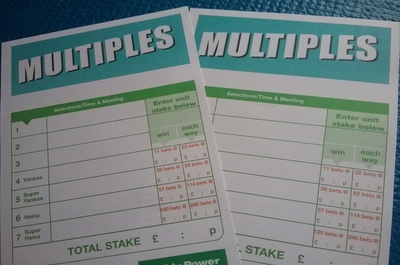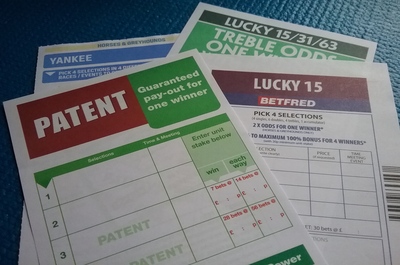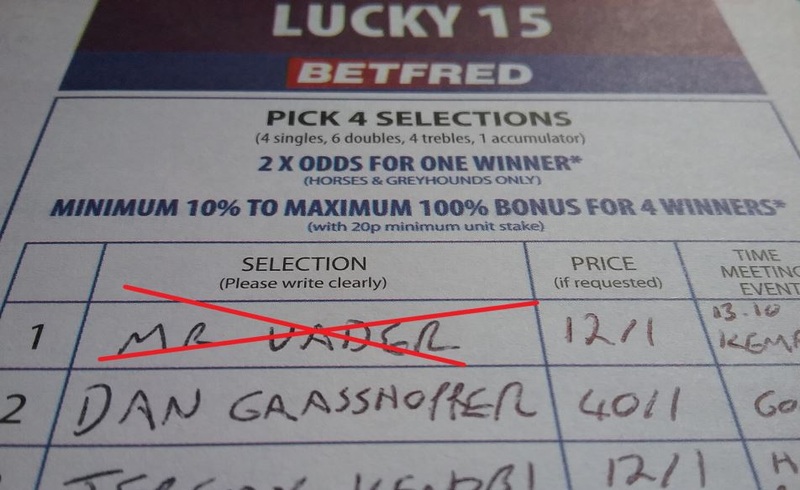 Accumulators – also known as multiples, or just shortened to accas – are bets that include more than one selection of events that are not directly related (meaning betting on Wayne Rooney to score first and England to win 1-0 is not an accumulator but one single bet, as the two elements are “related contingencies”). Accumulators and multiples require all of the selections to be successful for the overall bet to win. But if they are there is the potential for very big returns given the winnings (including your stake) from the first leg rolls over to act as the stake for the second leg of the bet which – if that wins – is used as the stake for the third leg of the bet and so on.
Accumulators – also known as multiples, or just shortened to accas – are bets that include more than one selection of events that are not directly related (meaning betting on Wayne Rooney to score first and England to win 1-0 is not an accumulator but one single bet, as the two elements are “related contingencies”). Accumulators and multiples require all of the selections to be successful for the overall bet to win. But if they are there is the potential for very big returns given the winnings (including your stake) from the first leg rolls over to act as the stake for the second leg of the bet which – if that wins – is used as the stake for the third leg of the bet and so on.
There is technically no limit to the number of selections you can include in an accumulator, though because the chances of winning become increasingly small as the number of selections increase many people opt to stick to doubles, treble, four-folds or five-folds. Of course, with multiples that include a large number of selections, while the chance of success is small, the odds can be massive – which is part of the appeal of this type of betting.
So for instance if you placed a four-fold accumulator bet (which are known as parlays in the United States) and each of your selections were priced at odds of 2/1 and you staked £10, it would work thus: assuming all selections won, the first leg of your accumulator would return a net win of £20 and would be combined with your original stake of £10 to have £30 on the second leg; that would return a total of £90 (including the stake) which goes on leg three of the bet which will return a total of £270 (including the £90 stake) which is put on the final leg giving a massive overall return of £810 and a net win of £800 from the original £10 stake.
So the appeal is obvious.
Types of Multiple Bets
 While the most simple form of multiple bets are the straight accumulators, for instance doubles, trebles, four-folds, five-folds and so on, there are various other types of multiples that punters can opt for. For instance, if you want to ensure your bet doesn’t collapse if one of your selections fails, you could opt for a “full cover with singles bet” which covers all possible winning outcomes from a number of selections. So, for instance, a full cover bet of four selections would include the four-fold accumulator, four trebles, six doubles and four single bets – a total of 15 bets. This particular full cover bet is known as a Lucky 15 and was purportedly invented by Betfred in 1984.
While the most simple form of multiple bets are the straight accumulators, for instance doubles, trebles, four-folds, five-folds and so on, there are various other types of multiples that punters can opt for. For instance, if you want to ensure your bet doesn’t collapse if one of your selections fails, you could opt for a “full cover with singles bet” which covers all possible winning outcomes from a number of selections. So, for instance, a full cover bet of four selections would include the four-fold accumulator, four trebles, six doubles and four single bets – a total of 15 bets. This particular full cover bet is known as a Lucky 15 and was purportedly invented by Betfred in 1984.
Other full cover bets have their own names as follows: Patent for the seven bets from three selections; Lucky 31 for the 31 bets from five legs; Lucky 63 for the (surprise, surprise) 63 bets from six legs.
For all these multiples your unit stake will be multiplied by the number of bets placed to give your total outlay, hence a £10 Lucky 31 would cost the princely sum of £310 (imagine the returns though!). As such many people opt for small unit stakes, often of 10p or 20p, but whatever your stake you will generally need at least two of the selections to come in to even break even given the number of bets you are covering.
Other full cover bets exist that do away with the singles; for instance the Trixie, which is just the Patent but excluding the singles, hence three doubles and a treble from the three selections. Other multiples of this format include the Yankee (like a Trixie but 11 bets from four selections), the Canadian (or Super Yankee) which is 26 bets from five legs, the Heinz (six legs, 57 bets… hence the name), the Super Heinz (120 bets, seven selections) and – the daddy – Goliath, 247 bets from eight selections.
Each Way Accumulators
 There is no such thing as a simplistic system of betting that turns bad bets into good ones or makes winning as simple as following a set structure or rule. However, there are some bets or ways of betting that are, broadly speaking at least, better than others. Each way doubles may be one such bet.
There is no such thing as a simplistic system of betting that turns bad bets into good ones or makes winning as simple as following a set structure or rule. However, there are some bets or ways of betting that are, broadly speaking at least, better than others. Each way doubles may be one such bet.
But how do each way accumulators – a double being the smallest possible acca (in our view at least, though some say fourfolds are the smallest accumulators) – actually work? We’ll return, briefly, to each way doubles in due course, but let us first explain how accumulators of this type work more generally.
Just like any each way bet, an each way acca requires two stakes, one for the win part of the wager and the other for the place. Equally, just as with any accumulator, your selections can be from a single sport or market or a combination of various ones, the only exclusions, typically, being that they cannot be related to each other. Each way accumulators are most commonly used for horse racing as this is probably the sport that best lends itself to each way punting in general but, nonetheless, they can be used for any sport or sports where each way bets can be placed.
Let us consider an each way acca as below:
| Leg | Sport | Bet | Odds | Each way terms |
|---|---|---|---|---|
| 1 | Horse racing | Mr Vader to win | 12/1 | A quarter to two places |
| 2 | Golf | Daniel Grasshopper III to win | 40/1 | A quarter to five places |
| 3 | Horse racing | Jeremy Kenobi | 12/1 | A quarter to three places |
| 4 | F1 | Peter Pfazstazfuk | 12/1 | A third to two places |
A punter might decide to create an each way acca covering four of the weekend’s big sporting events: the big horse races on Saturday and Sunday, plus the F1 Grand Prix and the big golf tournament. If they place a £10 each way acca (fourfold) on this, it will cost them £20. In order to win both the win part of the acca and the each way portion, all four legs must win.
As with any acca, if any leg loses (in this case we mean they neither win nor hit the required places specific to that leg), the whole bet is downed. So, for example, if the first three selections all romp to victory but everyone’s favourite made-up F1 driver Peter Pfazstazfuk only finishes third (each way for F1 is typically just for the first two), then you would lose both parts of your bet and thus £20.
If, on the other hand, good old Pfazstazfuk pulls off a brilliant overtaking manoeuvre on the last corner to pinch second, then the each way part of the acca would be a winner. The £10 win fourfold would be a loser as the fourth and final leg only landed the place. However, the £10 each way bet would deliver a very handy return of £8,800.
That equates to a £10 winning acca with odds of 3/1 (a quarter of 12/1) on two legs, 10/1 (a quarter of 40/1) and 4/1 (a third of 12/1). If all legs would have won that return would leap to a truly spectacular £909,570! Of course, even getting four places is a real achievement, so landing four winners at those sorts of prices takes some real doing and almost never happens.
The key things to remember when it comes to each way accas are:
- Bet requires two stakes
- All selections must win to land the win acca and the place acca
- If any selection does not at least place, both bets are lost
- A combination of legs winning and placing, or all placing, results in winning the each way portion of the acca only
- Each way terms (number of places and fraction of odds) are applied on a leg by leg basis
Each Way Doubles
 Accumulators are generally a bet that bookies love as the house edge is high, as we shall shortly explain. Therefore most shrewder punters and certainly professional and semi-professional gamblers do not generally place these bets. Really serious punters may place the occasional double if they feel they have found two really good-value selections that can be combined but otherwise they stick to singles normally.
Accumulators are generally a bet that bookies love as the house edge is high, as we shall shortly explain. Therefore most shrewder punters and certainly professional and semi-professional gamblers do not generally place these bets. Really serious punters may place the occasional double if they feel they have found two really good-value selections that can be combined but otherwise they stick to singles normally.
An each way double is perhaps not a wager that a professional punter will make too often. However, many would argue it is a good pick for a casual bettor at the horse races looking for something that may offer a decent return and lots of interest (in the races) without necessarily requiring too much in the way of racing knowledge. Normally each way bets are only made on selections with longer odds but by using them in doubles the place part of the bet can still yield a decent return.
Backing two selections priced at between evens and 2/1 as an each way double is a bet that can work well. If both win you are nicely in the black, whilst as long as they both at least place you will make a small loss or a small win, depending on the exact odds. Only if one fails to at least place will you lose entirely and, so the theory goes, given the short odds and the fact that these are typically favourites, that is relatively unlikely to happen. At the very least you should get a run for your money.
Void Bets in Accas
 Void bets can happen for any number of reasons, from a game of football being postponed due to a frozen pitch, a horse being withdrawn from a race due to the ground being too firm, or perhaps even a bookie error (such as a market being left up after the event had started or even finished). With a single wager, it is clear what would happen – the stake is simply returned to your account and it is as if the bet was never made. But what happens if you place an accumulator that includes a void selection?
Void bets can happen for any number of reasons, from a game of football being postponed due to a frozen pitch, a horse being withdrawn from a race due to the ground being too firm, or perhaps even a bookie error (such as a market being left up after the event had started or even finished). With a single wager, it is clear what would happen – the stake is simply returned to your account and it is as if the bet was never made. But what happens if you place an accumulator that includes a void selection?
Thankfully for those who have studied the entire card at a race meeting or poured over the stats from all 10 Premier League games one weekend, your whole acca is not voided. Instead, the relevant selection is simply discarded from the bet but the remaining selections stand as a valid accumulator.
Using the fourfold we gave earlier to illustrate this: if, for example, Mr Vader was a late non-runner and withdrew from the race, that selection alone would become a void bet. The fourfold is no more but the bet continues, now as a treble on the valid trio of picks. Had you made a 10-fold bet on all of the weekend’s Premier League matches that would become a nine-fold, whilst if your wager was just a double it would become a single. The same applies if more than one selection is void – any void picks are discounted with the rest of the acca standing.
The only time this may be an issue is if you were attempting to claim or qualify for an offer that specified your bet must be a minimum number of selections. If the acca insurance, bonus or boosted odds were only available for fourfolds and upwards, then the withdrawal of Mr Vader would have turned your bet into a treble and thus you would not be eligible for whichever promo you were trying to claim.
Void Picks With Multiples Bets

Some sites – including this one – use the terms multiples and accumulators interchangeably, at least some of the time. In this instance we are using the phrase multiples bet to talk about a more complex wager such as a Lucky 15, Lucky 63, Goliath or Super Heinz that is made up of various bets, including a number of accas.
Let us return once again to the fourfold acca we dreamed up:
| Leg | Sport | Bet | Odds | Each way terms |
|---|---|---|---|---|
| 1 | Horse racing | Mr Vader to win | 12/1 | A quarter to two places |
| 2 | Golf | Daniel Grasshopper III to win | 40/1 | A quarter to five places |
| 3 | Horse racing | Jeremy Kenobi | 12/1 | A quarter to three places |
| 4 | F1 | Peter Pfazstazfuk | 12/1 | A third to two places |
If this bet had been made as a Lucky 15, rather than a simple fourfold accumulator, then the withdrawal of Mr Vader would have had a far greater impact. A Lucky 15 would have included the following bets (note that the numbers relate to the legs as detailed above):
| Singles (x4) | Doubles (x6) | Trebles (x4) | Fourfold (x1) |
|---|---|---|---|
| 1 | 1-2 | 1-2-3 | 1-2-3-4 |
| 2 | 1-3 | 1-2-4 | |
| 3 | 1-4 | 2-3-4 | |
| 4 | 2-3 | 3-4-1 | |
| 2-4 | |||
| 3-4 |
Our racing punt on Mr Vader is leg one and so any bets that include that are affected. The single on the void selection is a “genuine” void and so if the Lucky 15 was for £5 per line (£75 in total) you would receive £5 back into your account for the unplaced single. The three doubles that included the non-runner would become singles, the three trebles would turn into doubles and the fourfold acca would become a treble on picks two, three and four.
In other words, whilst the impact is greater and more bets are affected, the principle is the same: any component wagers that include the void pick are reduced accordingly.
Payout Limits & Accas
 Earlier we suggested that the payout on our imaginary fourfold acca would be not too far shy of £1m if all legs won. Whilst technically correct, this does not take into account any payout limits that might apply. All bookies have payout limits that cap the most they will pay on various events and markets. Even if your winnings are theoretically over that amount you will not receive the full monies owed if the bookie operates with a payout limit.
Earlier we suggested that the payout on our imaginary fourfold acca would be not too far shy of £1m if all legs won. Whilst technically correct, this does not take into account any payout limits that might apply. All bookies have payout limits that cap the most they will pay on various events and markets. Even if your winnings are theoretically over that amount you will not receive the full monies owed if the bookie operates with a payout limit.
All bookies, be they high street betting shops or online bookmakers, have limits and these vary from one company to another and also according to the sports, event and market. As a general rule, the biggest, most popular betting sports, such as football and horse racing, have the highest limits. Within those sports you will find different limits according to the market and/or the level of competition.
Just as the largest limits are likely to be found in the biggest sports, within those disciplines the very largest caps of all will be for the main markets (race winner with the horses, for example, and match odds and outrights for football). In addition, races/matches at the highest level, for example Class 1 races in the UK, or Premier League and Champions League football matches, will have the very highest limits of them all.
It is very important to note that when it comes to accas and multiples that cover a range of events (each with their own payout limit), all major UK betting sites will normally apply the lowest relevant limit to the whole acca.
Once again returning to our fourfold example, a bookie might have the following maximum payouts listed on their site:
| Leg | Sport | Bet | Level/Class | Maximum Payout |
|---|---|---|---|---|
| 1 | Horse racing | Mr Vader to win | UK Class 1 | £1m |
| 2 | Golf | Daniel Grasshopper III to win | PGA Tour | £500,000 |
| 3 | Horse racing | Jeremy Kenobi | UK Class 1 | £1m |
| 4 | F1 | Peter Pfazstazfuk | Motorsports | £100,000 |
If you were lucky enough to land this incredible acca you might, but were unaware of how payout limits worked, you may be reasonably expecting to win a cool £900k+. However, if the bookie has listed a cap of “just” £100,000 for motorsports, the whole acca will be restricted to this amount. As such you would receive £100,000. That’s a fine win in anyone’s eyes but hardly the impressive £909,570 one might have been dreaming of.
Given such a limit there is no need to risk the full £10 stake that we initially discussed. The situation may be different if you are backing an each way acca but had you backed a fourfold with odds of 12/1, 12/1, 12/1 and 40/1 as a win single then your stake, and risk, could have been far lower. In fact, even a bet of just £1.12 would have led to a payout in excess of the £100,000 maximum, yielding £100,886.24.
In truth the majority of people place accas that cover just a single sport, chiefly football or horse racing. However, it is crucial if you opt for a more creative bet of this nature that you are aware of what the lowest maximum payout is across all the legs you have included and you can then adjust your stake accordingly.
How Do Accumulators Affect the Bookies Margin?

Earlier in the article we noted that as a general rule bookies love punters who place big accas. Whilst the headlines are captured by the occasional huge win the reality is that most accumulators lose. Sorry to break it to you!
This is because the bookie builds into all odds a margin for themselves, effectively meaning the prices offered are lower than they would be if they were accurately based on the estimated probability of each event happening. So in simple terms, if you tossed a coin with a bookie, rather than giving you a price of even money, because there is a 50% chance of heads and a 50% chance of tails, they would pay out at 10/11, 5/6 or maybe even just 4/5.
Punters love accas for the simple reason that they allow for the possibility of huge wins from small stakes. This is because with each leg the odds are effectively multiplied. However, it is not just the odds and the potential winnings that grow bigger. When you include several selections into an accumulator, the bookie’s margin is also multiplied.
You may see the cut the bookmaker takes referred to as the overround, margin, house edge, vig, vigorish or take. Some of these terms are subtly different from each other but they are fundamentally the same. Call it what you will, the margin the betting sites take ranges from almost nothing on some markets right up to 20% or even more on others.
Let us stick with our simplistic example of a coin toss, something that you can, perhaps surprisingly, actually bet on with many bookmakers, thanks to the coin toss in cricket. Let us imagine that you are betting with a bookie with decent odds and they offer the decent price of 10/11 for either outcome. This creates a book of 104.77% (evens on both would give 100%) and therefore an overround of 4.77%.
Now let us convert this sort of overround into an acca. If we imagine four games of cricket taking place simultaneously and a rather superstitious/uninformed punter who believed that all four coin tosses would be won by the home side. The true likelihood of this happening would be one in 16, because there is a one in two chance that the home side wins each separate toss. The “fair”, or unadjusted to create a margin for the bookie, odds, would be 15/1, meaning that you could bet on every possible combination of home win and away win in the four games and break even. This is because you could cover all 16 outcomes and one would win, returning in total 16 times your unit stake and recouping the losses on the other 15 losing bets.
However, if we calculate the winnings from such an acca, we can see that rather than a £10 bet returning £160, as it “should”, it would actually return just £132.83. The bookie’s margin has grown significantly. If you covered both possible outcomes with a single at 10/11 you would lose less than £1, based on a £10 stake. In fact, bet £10 on the home win (tails if you prefer) and £10 on the away win (heads) and you would have staked £20 and “won” £19.09, losing just 91p in total, or around 4.6% of your total (£20 stake).
If we run those same numbers for a fourfold acca with 16 possible outcomes we would, as noted, have staked £160 in total. As said, the returns at 10/11 for each of the four legs would be £132.83, meaning you would have lost £27.17. That represents almost three times your stake on each possible permutation and almost 17% of your total stake overall. So, rather than the bookie winning less than 5% of the monies staked, they are taking home closer to 20%. No wonder bookmakers love it when we all try and land that crazy accumulator.
Does That Mean Accas Are Bad?
 If your only aim in betting is to make a killing, then unless you are hugely confident that the bookies have got their odds wrong, you should be avoiding accas.
If your only aim in betting is to make a killing, then unless you are hugely confident that the bookies have got their odds wrong, you should be avoiding accas.
However, we know that when we play the lottery our chances of winning are minuscule (the odds of hitting the Euromillions jackpot, for example, are around one in 140 million). Odds and probabilities are all well and good but the concept of “it could be you” doesn’t just apply to the lottery.
There quite probably are many punters who place accumulators who are unaware that the bookies are rubbing their hands together. However, there are no doubt lots of others who are well aware that for every story they might read in the papers about four-, five- and even six-figure wins, there are tens of thousands of losing accumulators.
Gamblers who know that the bookies do well from accas but who are prepared to take on the odds anyway, do so because they dare to dream and know that maybe, just maybe, they could turn that bet of 10p, or £1 or a tenner into an awful lot more.
Offers For Accumulator Bets

One last thing to consider if you are interested in trying out multiples betting is that because of the bookie’s high margin they are able to offer a number of promotions for these bets. As usual, different sites have different offers and these may come and go or only be available for certain types of accumulators. Common promos to look out for, however, include:
- Enhanced odds – bookies may offer enhanced prices when you include a certain number of selections in an acca.
- Winnings bonuses – alternatively you may get a boost on winnings of anything from 10% to 100% or more if you manage to land a big acca. Typically the more selections your bet includes, the bigger the bonus.
- “One Right” Consolation – this promo usually applies to Lucky 15s, Lucky 31s or Lucky 63s and some similar wagers too. If you only manage to get one of your selections right the bookie may boost the odds on that winner by as much as five times the standard price. If the sole winner was at a decent price that can suddenly turn a losing multiple into a successful one.
- Acca Insurance – one of the most common accumulator-based promotions, this sort of deal softens the blow if you almost land an acca but just one leg lets you down. If this happens, such promos will typically refund your stake, either as a free bet or, even better, as real cash.
These sorts of promotions can make a big difference to your overall outcome financially. If you are someone who likes to place accas on a regular basis it is certainly well worth making sure you do so with a bookmaker that provides at least some of these extra perks.
